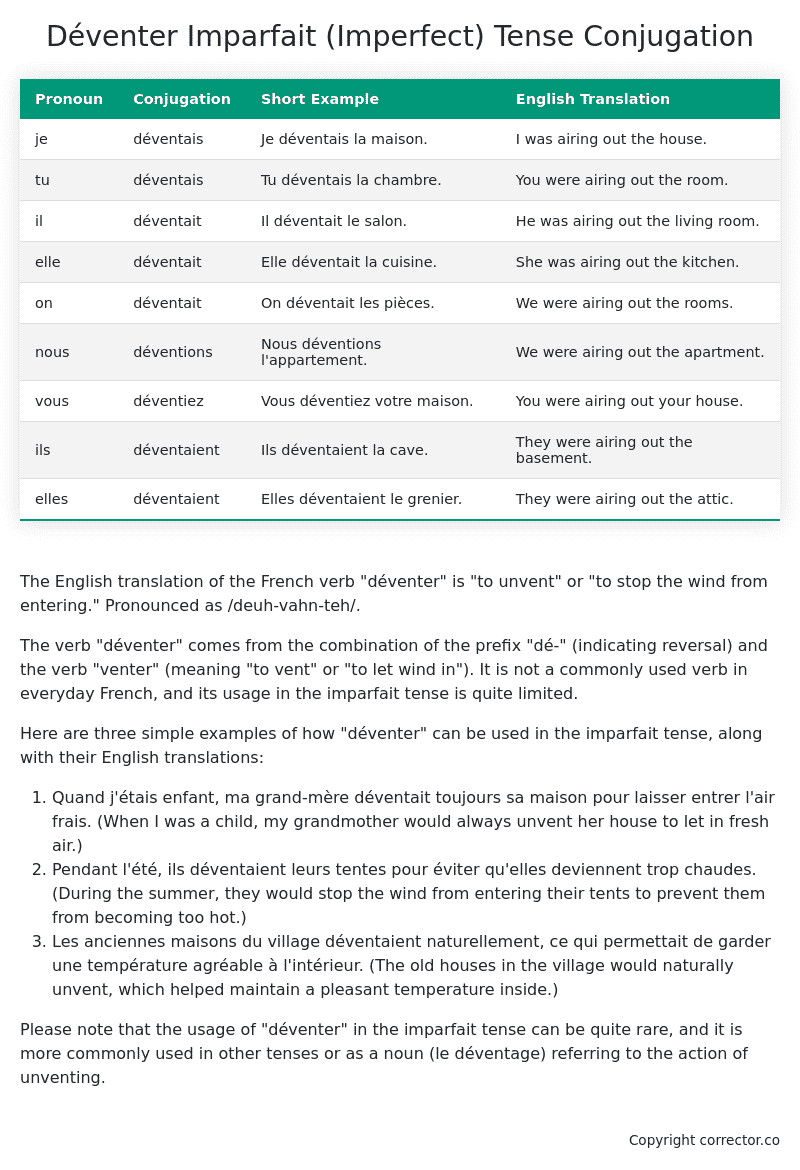Imparfait (Imperfect) Tense Conjugation of the French Verb déventer
Introduction to the verb déventer
The English translation of the French verb “déventer” is “to unvent” or “to stop the wind from entering.” Pronounced as /deuh-vahn-teh/.
The verb “déventer” comes from the combination of the prefix “dé-” (indicating reversal) and the verb “venter” (meaning “to vent” or “to let wind in”). It is not a commonly used verb in everyday French, and its usage in the imparfait tense is quite limited.
Here are three simple examples of how “déventer” can be used in the imparfait tense, along with their English translations:
- Quand j’étais enfant, ma grand-mère déventait toujours sa maison pour laisser entrer l’air frais. (When I was a child, my grandmother would always unvent her house to let in fresh air.)
- Pendant l’été, ils déventaient leurs tentes pour éviter qu’elles deviennent trop chaudes. (During the summer, they would stop the wind from entering their tents to prevent them from becoming too hot.)
- Les anciennes maisons du village déventaient naturellement, ce qui permettait de garder une température agréable à l’intérieur. (The old houses in the village would naturally unvent, which helped maintain a pleasant temperature inside.)
Please note that the usage of “déventer” in the imparfait tense can be quite rare, and it is more commonly used in other tenses or as a noun (le déventage) referring to the action of unventing.
Table of the Imparfait (Imperfect) Tense Conjugation of déventer
| Pronoun | Conjugation | Short Example | English Translation |
|---|---|---|---|
| je | déventais | Je déventais la maison. | I was airing out the house. |
| tu | déventais | Tu déventais la chambre. | You were airing out the room. |
| il | déventait | Il déventait le salon. | He was airing out the living room. |
| elle | déventait | Elle déventait la cuisine. | She was airing out the kitchen. |
| on | déventait | On déventait les pièces. | We were airing out the rooms. |
| nous | déventions | Nous déventions l’appartement. | We were airing out the apartment. |
| vous | déventiez | Vous déventiez votre maison. | You were airing out your house. |
| ils | déventaient | Ils déventaient la cave. | They were airing out the basement. |
| elles | déventaient | Elles déventaient le grenier. | They were airing out the attic. |
Other Conjugations for Déventer.
Le Present (Present Tense) Conjugation of the French Verb déventer
Imparfait (Imperfect) Tense Conjugation of the French Verb déventer (You’re reading it right now!)
Passé Simple (Simple Past) Tense Conjugation of the French Verb déventer
Passé Composé (Present Perfect) Tense Conjugation of the French Verb déventer
Futur Simple (Simple Future) Tense Conjugation of the French Verb déventer
Futur Proche (Near Future) Tense Conjugation of the French Verb déventer
Plus-que-parfait (Pluperfect) Tense Conjugation of the French Verb déventer
Passé Antérieur (Past Anterior) Tense Conjugation of the French Verb déventer
Futur Antérieur (Future Anterior) Tense Conjugation of the French Verb déventer
Subjonctif Présent (Subjunctive Present) Tense Conjugation of the French Verb déventer
Subjonctif Passé (Subjunctive Past) Tense Conjugation of the French Verb déventer
Subjonctif Imparfait (Subjunctive Imperfect) Tense Conjugation of the French Verb déventer
Subjonctif Plus-que-parfait (Subjunctive Pluperfect) Tense Conjugation of the French Verb déventer
Conditionnel Présent (Conditional Present) Tense Conjugation of the French Verb déventer
Conditionnel Passé (Conditional Past) Tense Conjugation of the French Verb déventer
Conditionnel Passé II (Conditional Past II) Tense Conjugation of the French Verb déventer
L’impératif Présent (Imperative Present) Tense Conjugation of the French Verb déventer
L’impératif Passé (Imperative Past) Tense Conjugation of the French Verb déventer
L’infinitif Présent (Infinitive Present) Tense Conjugation of the French Verb déventer
L’infinitif Passé (Infinitive Past) Tense Conjugation of the French Verb déventer
Le Participe Présent (Present Participle) Tense Conjugation of the French Verb déventer
Le Participe Passé (Past Participle) Tense Conjugation of the French Verb déventer
Struggling with French verbs or the language in general? Why not use our free French Grammar Checker – no registration required!
Get a FREE Download Study Sheet of this Conjugation 🔥
Simply right click the image below, click “save image” and get your free reference for the déventer imparfait tense conjugation!

Déventer – About the French Imparfait Tense
NOTE: To take a deep dive into all the French tenses then see our article on Mastering French Tense Conjugation.
Formation of the Imparfait Tense
For regular -er verbs:
For regular -ir verbs
For regular -re verbs
Common Everyday Usage Patterns
Description of Past Habits
Background Information
Mental and Emotional States
It’s employed to express emotions, thoughts, or physical sensations in the past. For example: “J’étais content quand il est arrivé.” (I was happy when he arrived.)
Ongoing Actions
Points to Note About the Imparfait Tense
Passé Composé vs. Imparfait
Conditional
Si Clauses
Narration
I hope you enjoyed this article on the verb déventer. Still in a learning mood? Check out another TOTALLY random French verb imparfait conjugation!


